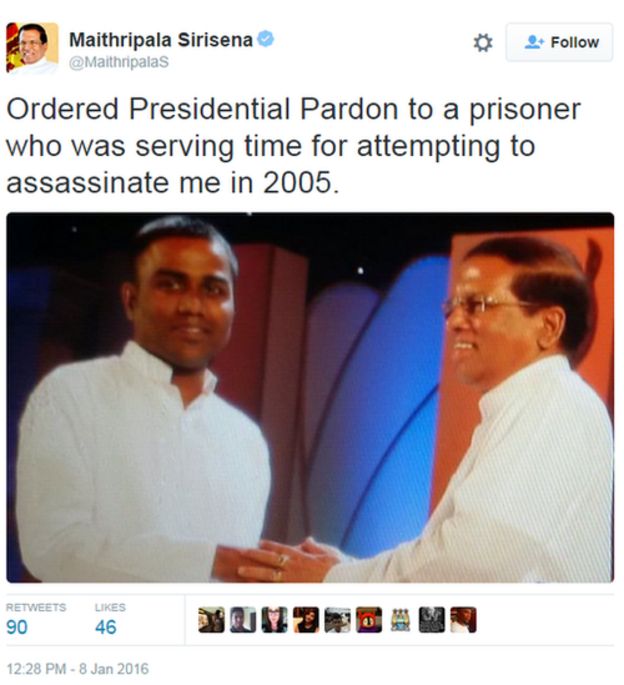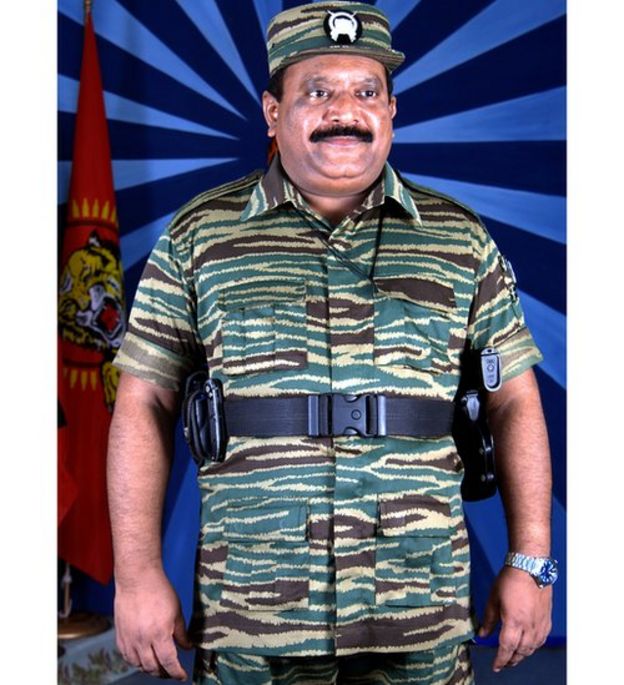Sri Lanka president pardons militant who tried to kill him
- 8 January 2016
- From the section Asia
Sri Lanka’s president, Maithripala Sirisena, has pardoned a former Tamil Tiger militant convicted of trying to assassinate him more than a decade ago.
Mr Sirisena set free Sivaraja Jenivan at a ceremony to mark his first year in power. The men shook hands on stage.
Jenivan was arrested in 2006, but was only convicted – and given a 10-year prison sentence – last year.
The Tamil Tigers’ 25-year fight for an independent state in the north of the country ended in their defeat in 2009.
Jenivan, now aged 36, was taken into custody in April 2006, accused of being part of an attempt a year earlier to kill Mr Sirisena, who was then a senior cabinet minister.
He was sentenced by the Polonnaruwa High Court only in July last year.
In pardoning him, Jenivan’s lawyer said the president had taken into account the fact that the former militant had already been detained for 10 years.
At his anniversary celebration, President Sirisena pardoned and blessed Jenivan, touching him on the head and shaking his hand in front of a crowd.
He later tweeted a photo of himself on stage with Jenivan, with a caption reading: “Ordered Presidential Pardon to a prisoner who was serving time for attempting to assassinate me in 2005”.

The Liberation Tigers of Tamil Eelam (LTTE) was a separatist rebel group led by Velupillai Prabhakaran who, to his followers, was a freedom fighter struggling for emancipation for the minority Tamils.
The group used suicide bombings to attack Sri Lanka’s capital, Colombo, in the 1990s, killing high-profile figures including former Sri Lankan President Ranasinghe Premadasa.
In the closing stages of the war in 2009, both sides were accused of committing atrocities.

Upon taking power, Mr Sirisena pledged a truth and reconciliation commission to investigate the claims of abuses.
In October a government-led inquiry found that there were “credible” allegations that the army had committed war crimes during the conflict.
In the same month, 223 Tamil prisoners went on hunger strike demanding to be freed. Some have been released but most remain in prison.
[youtube https://www.youtube.com/watch?v=VptToeNMhLk&w=420&h=315]
—————————————————————————————————————————

Sri Lankan soldier gets death penalty for killing 8 Tamil civilians in Jaffna
A Sri Lankan soldier was on Thursday sentenced to death for killing eight Tamil civilians, including four minors, by slitting their throats in Jaffna nearly 15 years ago, in a rare case of the military being held to account for its actions.
Staff Sergeant Sunil Ratnayake was given capital punishment by a two-judge High Court in Colombo while four of the soldier’s colleagues were acquitted due to lack of direct evidence against them. The massacre at the village of Mirusuvil in the Jaffna peninsula came to light when another man in the group of civilians escaped the military attack and raised the alarm. Court heard that the victims were killed by slitting their throats and burying them in a mass grave in Jaffna. The incident had occurred on December 19, 2000. They had gone to check the ruins of their bombed homes following a ferocious bout of fighting between Tamil Tigers in that area.
Instead of the usual sweeping such allegations under the carpet, the then government of President Chandrika Kumaratunga suspended the entire unit of soldiers and subsequently arrested five men who were indicted in 2003. Following the lengthy legal process, the final decision was delivered today in a rare case of military being held to account for its actions.
“Today’s sentencing showed that the military was following due process in dealing with abuses committed during the war,” army spokesman Jayanath Jayaweera said. “This is a good example to show the system is working well,” Brigadier Jayaweera told reporters. Sri Lanka’s army faces allegations that it killed at least 40,000 Tamil civilians in the final months of fighting that ended in May 2009.
The previous government of strong man Mahinda Rajapaksa maintained that not a single civilian was killed by troops, while his successor Maithripala Sirisena has agreed to probe the allegations.
